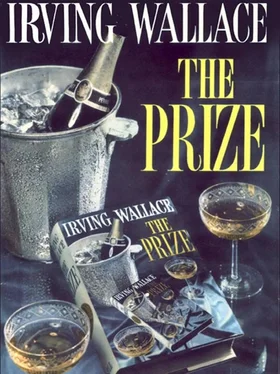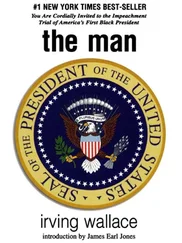‘When was Freud nominated for the literary prize?’
‘In 1936, in his eightieth year. It had been predicted, you know, but rather as a sarcastic joke. In 1927, the psychiatrist and physician, Julius Wagner von Jauregg, won our medical award for malaria inoculation used in paralysis. Well, the Freudians, of whom he disapproved, crowded about to congratulate him, and von Jauregg told them, “Gentlemen, someday you will all get the Nobel Prize-for literature.” And it almost came to pass. In 1936, Romain Rolland and Thomas Mann nominated Freud for the Nobel literary award. Freud was a serious candidate that year, but in the end, the Swedish Academy voted him down. Sigmund Freud lost out to Eugene O’Neill. There is hidden history for you.’
They had arrived at the entrance to the Grand Hotel, and Jacobsson took his leave. He indicated the bulging package of three bottles nested in the crook of Craig’s arm.
‘Do not let Sue Wiley see you,’ he said with a smile. And then he added, almost too gently, ‘And do not forget tonight you are a guest of the King.’
Watching Jacobsson depart, Craig wondered about the old gentleman’s last remark. Did he suspect what that bitch, Sue Wiley, already knew? Had he, in his indirect and courtly way, tried to put Craig on his guard and warn him of the consequences of a scandal?
Hell, Craig thought, nothing happened to Knut Hamsun, did it? He hugged the package more tightly in his arm. Momentarily, he felt secure, three bottles secure. But he would go easy right now. He regretted that he had not reassured Jacobsson. He could have told him that tonight he would be fit for a King.
IN a corner of his restfully quiet, lamp-lighted library, Count Bertil Jacobsson, attired in starched shirt, white braces, cummerbund, and formal trousers, sat at his antiquated walnut desk-a reproof to the new generation’s intense modernism-and thoughtfully tapped the capped end of his pen against the open green ledger before him.
He contemplated the shadows cast on the high ceiling, and across a wall of books, and on the nearby glass case that held his Nobel award souvenirs, and at last, knowing the hour was late and the limousine would soon arrive, he resumed his Notes. In his pinched chirography, he wrote:
– was one of the rare occasions in which I had to intercede between a laureate and the press. It may be true that Craig drinks-I do not know yet-but if it is true, his resultant behaviour could damage us and ruin him. The Knut Hamsun incident still haunts me. We shall see how matters develop tonight.
He read over what he had written, and was about to put the pen back in its holder when he decided to add a paragraph less speculative and more factual.
The Royal Banquet has been moved up to tonight, which is December 3, and will formally inaugurate Nobel Week. Except for the afternoon of the climactic Ceremony, and the Town Hall dinner that follows it, the Royal Banquet, highly exclusive and dominated by the presence of the King, is often the most memorable social event of our winter season. I remember that after he had received the prize for literature in 1923, William Butler Yeats, the Irish poet, wrote of the Banquet, ‘I, who have never seen a court, find myself before the evening is ended moved as if by some religious ceremony.’ I trust that this year’s winners will be similarly impressed.
Carefully, Jacobsson blotted the page, closed the green ledger, and placed it in the middle drawer of his desk.
With an indistinct complaint, he stood up, pulled on his formal jacket, and then started for the bedroom to find the decorations that he must wear. The decorations, he knew, would soothe him. They would remind him of long experience and exemplary performance, in the service of the throne, in handling all manners and nationalities of men. He hoped that he would not need the confidence of these decorations this night.
It was almost seven o’clock when Andrew Craig finished changing from his single-breasted tuxedo into his freshly pressed dark blue suit, and it was the second time he had dressed for the evening.
The half-bottle of Scotch that he had consumed through the late afternoon, sparingly and in the privacy of the bathroom, out of sight of Leah’s disapproving gaze, had made him forgetful of the duplicated instructions about attire for the Royal Banquet. It was only after he had answered the door earlier, and admitted Mr. Manker, the prim and punctilious young attaché with the high pompadour who had been assigned to him by the Swedish Minister of Foreign Affairs, that he had been tactfully reminded of protocol.
Mr. Manker had removed his felt fedora and overcoat, and placed both neatly on a maroon chair, and had sat stiffly on the sofa, while Craig, his mouth cottony from the drinking, had tried to think of conversation. The awkward pause had been filled by Leah’s zestful entrance from her bedroom.
‘Hello, Mr. Manker! Have you come for inspection? How do I look?’ She pirouetted once, gaily, rather clumsily, Craig thought. Her brown hair was swept back and bunned more tightly than usual, her face unlined and flawless and unsoftened by the make-up, and the evening gown of red satin that hung straight down along her rigid figure.
Mr. Manker had leaped to his feet, clucking approval, then gallantly clicked his heels and bent over her hand. ‘Exquisite,’ he had murmured, and Craig, watching hazily, detected false professionalism and disliked it. ‘It is a terrible bother, this protocol,’ Mr. Manker went on, ‘but it is the way of monarchies, no matter how democratic. I, for one, approve. It gives us islands of dignity in the drab land mass.’
‘I approve, too,’ said Leah with pleasure.
Mr. Manker took brief stock of Craig, and his lower lip worked in and out. ‘For the annual Royal Banquet,’ he said, ‘His Majesty the King wears formal evening dress-’
‘And a crown?’ asked Leah.
‘Heavens, no. The crown is there, but as a symbol,’ said Mr. Manker. ‘You shall see for yourself at the dinner. The King’s family and relatives, and the few higher-ranking members of royalty who have been invited, also are in formal evening garments. Perhaps some will wear the uniforms of their station. The Ambassadors whose nations are represented in the Nobel awards, and our Cabinet members, wear dark but informal suits. The ladies of the court, and commoners, all wear similar dresses-black taffeta or velvet with puffed sleeves. This is to prevent one from outdoing the other. The wives or relatives of the laureates may wear evening gowns of any design or colour. Miss Decker is handsomely attired. The male laureates, like our Cabinet members, are expected to wear informal dark suits. Full dress is only expected at the Nobel Ceremony on the tenth.’
Craig realized that Mr. Manker had been addressing him, and suddenly he realized what was wrong. ‘I’m not supposed to have a tux on for this brawl, is that it?’
‘You will not be barred,’ Mr. Manker said with his trained smile, ‘but you may be mistaken for a member of the royal family. Yes, as you understand it, a plain dark suit is preferred.’
‘I’ll change,’ said Craig.
‘As you wish,’ said Mr. Manker, his face reflecting relief. ‘But before you go, while we have the time-I came early for this-a few words about further protocol. I hope you do not think me insufferable, but it is my duty. I extend this briefing to laureates every year.’
‘Go on,’ said Craig.
‘Cocktails will be served in one of the salons off the dining-hall. This will take place for half an hour to perhaps one hour before the dinner. The purpose is really for our laureates to meet distinguished members of our government, and to meet each other.’
‘I already met the other winners at the Press Club this afternoon,’ said Craig.
Читать дальше












